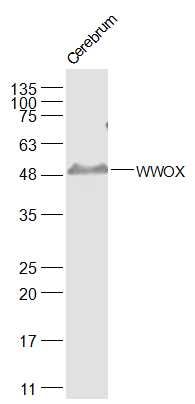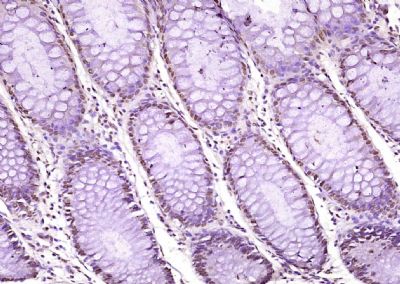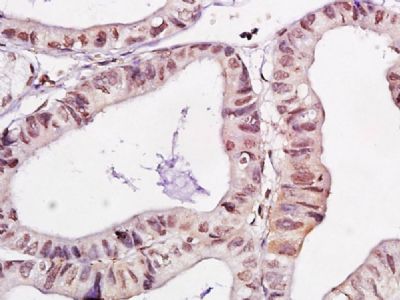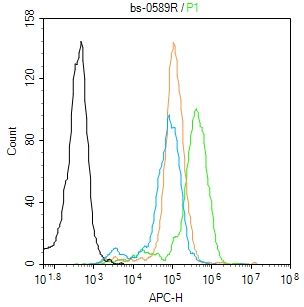包含氧化还原酶的WW域抗体
产品名称: 包含氧化还原酶的WW域抗体
英文名称: WWOX
产品编号: 0589
产品价格: null
产品产地: 上海
品牌商标: 雅吉
更新时间: null
使用范围: WB ELISA IHC-P IHC-F Flow-Cyt IF
上海雅吉生物科技有限公司
- 联系人 :
- 地址 : 上海市闵行区元江路5500号第1幢5658室
- 邮编 :
- 所在区域 : 上海
- 电话 : 158****3937 点击查看
- 传真 : 点击查看
- 邮箱 : yajikit@163.com
| 中文名称 | 包含氧化还原酶的WW域抗体 |
| 别 名 | D16S432E; FOR; FOR II protein; FRA16D; Fragile 16D oxido reductase; fragile site FRA16D oxidoreductase; HHCMA 56; HHCMA56; PRO0128; putative oxidoreductase; WOX 1; WOX1; WW domain containing oxidoreductase; WW domain-containing protein WWOX; WWOX2; WWOX4; WWOX8; WWOX. |
| 研究领域 | 肿瘤 免疫学 神经生物学 信号转导 转录调节因子 线粒体 表观遗传学 Alzheimer's |
| 抗体来源 | Rabbit |
| 克隆类型 | Polyclonal |
| 交叉反应 | Human, Mouse, (predicted: Rat, ) |
| 产品应用 | WB=1:500-2000 ELISA=1:500-1000 IHC-P=1:100-500 IHC-F=1:100-500 Flow-Cyt=1ug/test IF=1:100-500 (石蜡切片需做抗原修复) not yet tested in other applications. optimal dilutions/concentrations should be determined by the end user. |
| 分 子 量 | 46kDa |
| 细胞定位 | 细胞核 细胞浆 线粒体 |
| 性 状 | Liquid |
| 浓 度 | 1mg/ml |
| 免 疫 原 | KLH conjugated synthetic peptide derived from human WWOX:5-100/414 |
| 亚 型 | IgG |
| 纯化方法 | affinity purified by Protein A |
| 储 存 液 | 0.01M TBS(pH7.4) with 1% BSA, 0.03% Proclin300 and 50% Glycerol. |
| 保存条件 | Shipped at 4℃. Store at -20 °C for one year. Avoid repeated freeze/thaw cycles. |
| PubMed | PubMed |
| 产品介绍 | WW domain-containing proteins are found in all eukaryotes and play an important role in the regulation of a wide variety of cellular functions such as protein degradation, transcription, and RNA splicing. This gene encodes a protein which contains 2 WW domains and a short-chain dehydrogenase/reductase domain (SRD). The highest normal expression of this gene is detected in hormonally regulated tissues such as testis, ovary, and prostate. This expression pattern and the presence of an SRD domain suggest a role for this gene in steroid metabolism. The encoded protein is more than 90% identical to the mouse protein, which is an essential mediator of tumor necrosis factor-alpha-induced apoptosis, suggesting a similar, important role in apoptosis for the human protein. In addition, there is evidence that this gene behaves as a suppressor of tumor growth. Alternative splicing of this gene generates transcript variants that encode different isoforms. [provided by RefSeq, Jul 2008] Function: Putative oxidoreductase. Acts as a tumor suppressor and plays a role in apoptosis. Required for normal bone development (By similarity). May function synergistically with p53/TP53 to control genotoxic stress-induced cell death. Plays a role in TGFB1 signaling and TGFB1-mediated cell death. May also play a role in tumor necrosis factor (TNF)-mediated cell death. Inhibits Wnt signaling, probably by sequestering DVL2 in the cytoplasm. Subcellular Location: Cytoplasm. Nucleus. Mitochondrion. Golgi apparatus. Partially localizes to the mitochondria. Translocates to the nucleus upon genotoxic stress or TNF stimulation (By similarity). Translocates to the nucleus in response to TGFB1. Isoform 5 and isoform 6 may localize in the nucleus. Target information above from: UniProt accessionQ9NZC7 The UniProt Consortium The Universal Protein Resource (UniProt) in 2010 Nucleic Acids Res. 38:D142-D148 (2010). Tissue Specificity: Widely expressed. Strongly expressed in testis, prostate, and ovary. Overexpressed in cancer cell lines. Isoform 5 and isoform 6 may only be expressed in tumor cell lines. Post-translational modifications: Phosphorylated upon genotoxic stress. Phosphorylation of Tyr-33 regulates interaction with TP53, TP73 and MAPK8. May also regulate proapoptotic activity. Phosphorylation by TNK2 is associated with polyubiquitination and degradation. Ubiquitinated when phosphorylated by TNK2, leading to its degradation. DISEASE: Note=Defects in WWOX may be involved in several cancer types. The gene spans the second most common chromosomal fragile site (FRA16D) which is frequently altered in cancers. Alteration of the expression and expression of some isoforms is associated with cancers. However, it is still unclear if alteration of WWOX is directly implicated in cancerogenesis or if it corresponds to a secondary effect. Defects in WWOX may be a cause of esophageal cancer (ESCR) [MIM:133239]. Similarity: Belongs to the short-chain dehydrogenases/reductases (SDR) family. Contains 2 WW domains. SWISS: Q9NZC7 Gene ID: 51741 Database links: Entrez Gene: 618792 Cow Entrez Gene: 51741 Human Entrez Gene: 80707 Mouse Entrez Gene: 292041 Rat Omim: 605131 Human SwissProt: Q9NZC7 Human SwissProt: Q91WL8 Mouse Unigene: 461453 Human Unigene: 440420 Mouse Important Note: This product as supplied is intended for research use only, not for use in human, therapeutic or diagnostic applications. |
| 产品图片 |  Sample: Sample:Cerebrum (Mouse) Lysate at 40 ug Primary: Anti-WWOX (bs-0589R) at 1/500 dilution Secondary: IRDye800CW Goat Anti-Rabbit IgG at 1/20000 dilution Predicted band size: 46 kD Observed band size: 46 kD  Paraformaldehyde-fixed, paraffin embedded (human colon carcinoma); Antigen retrieval by boiling in sodium citrate buffer (pH6.0) for 15min; Block endogenous peroxidase by 3% hydrogen peroxide for 20 minutes; Blocking buffer (normal goat serum) at 37°C for 30min; Antibody incubation with (WWOX) Polyclonal Antibody, Unconjugated (bs-0589R) at 1:200 overnight at 4°C, followed by operating according to SP Kit(Rabbit) (sp-0023) instructionsand DAB staining. Paraformaldehyde-fixed, paraffin embedded (human colon carcinoma); Antigen retrieval by boiling in sodium citrate buffer (pH6.0) for 15min; Block endogenous peroxidase by 3% hydrogen peroxide for 20 minutes; Blocking buffer (normal goat serum) at 37°C for 30min; Antibody incubation with (WWOX) Polyclonal Antibody, Unconjugated (bs-0589R) at 1:200 overnight at 4°C, followed by operating according to SP Kit(Rabbit) (sp-0023) instructionsand DAB staining. Tissue/cell: human gastric carcinoma; 4% Paraformaldehyde-fixed and paraffin-embedded; Tissue/cell: human gastric carcinoma; 4% Paraformaldehyde-fixed and paraffin-embedded;Antigen retrieval: citrate buffer ( 0.01M, pH 6.0 ), Boiling bathing for 15min; Block endogenous peroxidase by 3% Hydrogen peroxide for 30min; Blocking buffer (normal goat serum,C-0005) at 37℃ for 20 min; Incubation: Anti-WWOX Polyclonal Antibody, Unconjugated(bs-0589R) 1:200, overnight at 4°C, followed by conjugation to the secondary antibody(SP-0023) and DAB(C-0010) staining  Blank control:Molt-4. Blank control:Molt-4.Primary Antibody (green line): Rabbit Anti-WWOX antibody (bs-0589R) Dilution: 1μg /10^6 cells; Isotype Control Antibody (orange line): Rabbit IgG . Secondary Antibody : Goat anti-rabbit IgG-AF647 Dilution: 1μg /test. Protocol The cells were fixed with 4% PFA (10min at room temperature)and then permeabilized with 90% ice-cold methanol for 20 min at-20℃. The cells were then incubated in 5%BSA to block non-specific protein-protein interactions for 30 min at at room temperature .Cells stained with Primary Antibody for 30 min at room temperature. The secondary antibody used for 40 min at room temperature. Acquisition of 20,000 events was performed. |
